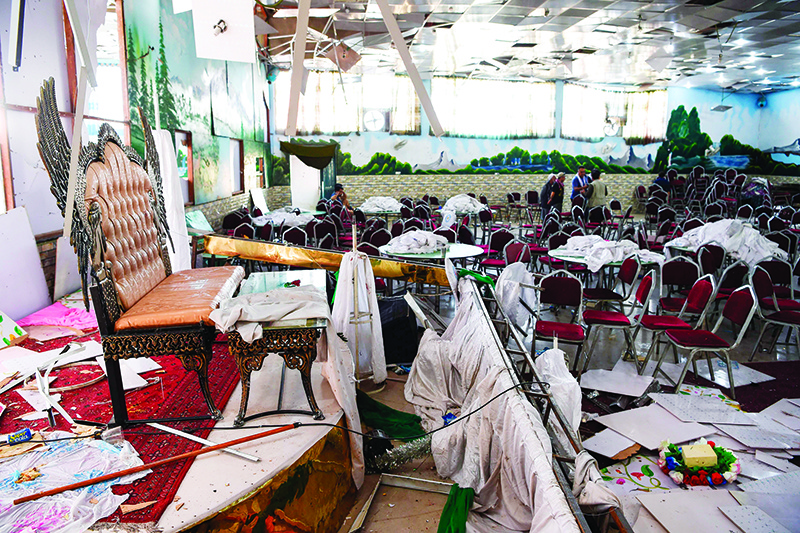
KABUL: Joy and
celebration turned into horror and carnage when an Islamic State suicide bomber
targeted a packed Afghan wedding hall, killing at least 63 people in the
deadliest attack to rock Kabul in months, officials and witnesses said
yesterday. The massive blast, which took place late Saturday in west Kabul,
came as Washington and the Taleban finalize a deal to reduce the US military
presence in Afghanistan and hopefully build a roadmap to a ceasefire.
The groom
recalled greeting smiling guests in the afternoon, before seeing their bodies
being carried out hours later. The attack "changed my happiness to
sorrow", the young man, who gave his name as Mirwais, told local TV
station Tolo News. "My family, my bride are in shock, they cannot even
speak. My bride keeps fainting," he said. "I lost my brother, I lost
my friends, I lost my relatives. I will never see happiness in my life
again." Interior ministry spokesman Nasrat Rahimi said a suicide bomber
carried out the attack, with at least 63 people killed and 182 injured.
"Among the wounded are women and children," Rahimi said.
HH the Amir of
Kuwait Sheikh Sabah Al-Ahmad Al-Jaber Al-Sabah yesterday sent a cable of
condolence to Afghan President Mohammad Ashraf Ghani over the victims of the
terrorist explosion. In the cable, the Amir voiced Kuwait's emphatic
denunciation of this odious terrorist act that targeted innocents, while
reiterating Kuwait's rejection of all forms and manifestations of terrorism.
Sheikh Sabah prayed to Almighty Allah to bestow mercy upon the victims and
patience to their families, wishing a swift recovery to those injured in the
blast. HH the Crown Prince Sheikh Nawaf Al-Ahmad Al-Jaber Al-Sabah and HH the
Prime Minister Sheikh Jaber Al-Mubarak Al-Hamad Al-Sabah sent similar cables
Afghan weddings
are epic and vibrant affairs, with hundreds or often thousands of guests
celebrating for hours inside industrial-scale wedding halls where men are
usually segregated from women and children. "The wedding guests were
dancing and celebrating the party when the blast happened," recounted
Munir Ahmad, 23, who was seriously injured and whose cousin was among the dead.
"Following the explosion, there was total chaos. Everyone was screaming
and crying for their loved ones," he told AFP from his bed in a local
hospital, where he was being treated for shrapnel wounds.
Images from
inside the hall showed blood-stained bodies on the ground along with pieces of
flesh and torn clothes, hats, sandals and bottles of mineral water. The huge
blast ripped parts of the ceiling off. The wedding was largely a gathering of
Shiite Muslims, who frequently are targeted in Sunni-majority Afghanistan,
particularly by IS. The extremist group's Afghan affiliate claimed
responsibility for the blast, saying the bomber targeted the wedding because it
was Shiite.
Wedding guest
Hameed Quresh told AFP the young bride and groom were saying their vows when
the bomb went off. "We fainted following the blast, and we don't know who
brought us to the hospital," sobbed Quresh, who lost one brother and was
himself wounded. Another guest told Tolo that some 1,200 people had been
invited. With low security, weddings are seen as easy targets.
The attack sent a
wave of grief through a city grimly accustomed to atrocities and garnered broad
condemnation. President Ghani called it "barbaric", while
Afghanistan's chief executive Abdullah Abdullah described it as a "crime
against humanity". US ambassador to Afghanistan John Bass called it an act
of "extreme depravity".
The attack
underscores both the inadequacy of Afghanistan's security forces and the scale
of the problem they face. While the police and army claim they prevent most
bombings from ever happening, the fact remains that insurgents pull off
horrific attacks with chilling regularity. On July 28, at least 20 people were
killed when attackers targeted Ghani's running mate Amrullah Saleh during
presidential election campaigning. The incident showed how, even amid tight
security and known threats, insurgents still conduct brazen attacks.
The issue also
goes to the heart of a prospective deal between the US and the Taliban that
would see Washington begin to withdraw its approximately 14,000 soldiers from
Afghanistan. The deal relies on Taleban guarantees they will stop groups such
as Al-Qaeda and IS from using Afghanistan as a safe haven. Saturday's attack
suggests any such promise would be tough to keep. The "Taleban cannot
absolve themselves of blame, for they provide platform for terrorists,"
Ghani said.
Few believe such
a deal will bring quick peace and Afghans fear the Taleban could return,
eroding hard-won rights for women in particular and leading to a spiralling
civil war. Meanwhile, in the northern province of Balkh, 11 members of the same
family were killed when their car hit a roadside bomb, officials said. The
provincial governor blamed the Taleban for planting the device. - Agencies










